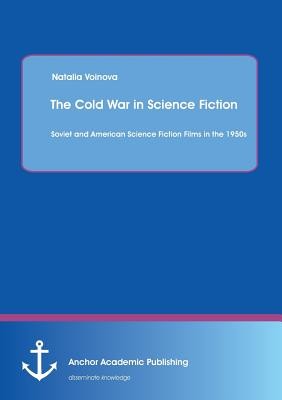
- We will send in 10–14 business days.
- Author: Natalia Voinova
- Publisher: Anchor Academic Publishing
- Year: 2013
- Pages: 46
- ISBN-10: 3954890585
- ISBN-13: 9783954890583
- Format: 14.8 x 21 x 0.3 cm, minkšti viršeliai
- Language: English
- SAVE -10% with code: EXTRA
Reviews
Description
This study will compare the USSR and the United States according to their cinematic use of science fiction in the late 1950s and 1960s in order to coincide with the period of de-Stalinisation and thaw in the USSR, and late McCarthyism in the United States. The genre provides an opportunity to express the two powers' scientific stand-off through fiction, and serves as a vehicle for the dissemination of ideas and propaganda. Post-1956 marks the time when the period of de-Stalinisation officially began and science fiction saw a carefully crafted rebirth for it served as a tool that could reflect the socialist ideal and quasi-religious faith in science that was promoted by the party. Science fiction uniquely demands for an imaginative view of the future, and therefore, corresponds with the Marxist- Leninist future-oriented ideology. For this period, the themes for American science fiction are hyperbolised monsters and invasion, and reflect the fear of the otherness of the Soviet Union, and its threat on domestic ideals. These themes are reflected in movies as 'Angry Red Planet', and 'Them!'. On the other hand, Soviet science fiction movies focus on the heroic Soviet man who frequently receives calls for help from outer space, and overcomes great trials to save those not living in utopia. This storyline is represented in 'Towards a Dream', and 'The Sky is calling'. The author gives special attention to the Soviet movie 'The Sky is calling' and the subsequent redubbed American version 'Battle beyond the Sun'. Further, she addresses alterations or plot, and subtle propaganda messages in the Soviet movies 'Planet of Storms', and the Hollywood remake 'Journey to the Prehistoric Planet'.
EXTRA 10 % discount with code: EXTRA
The promotion ends in 23d.22:49:45
The discount code is valid when purchasing from 10 €. Discounts do not stack.
- Author: Natalia Voinova
- Publisher: Anchor Academic Publishing
- Year: 2013
- Pages: 46
- ISBN-10: 3954890585
- ISBN-13: 9783954890583
- Format: 14.8 x 21 x 0.3 cm, minkšti viršeliai
- Language: English English
This study will compare the USSR and the United States according to their cinematic use of science fiction in the late 1950s and 1960s in order to coincide with the period of de-Stalinisation and thaw in the USSR, and late McCarthyism in the United States. The genre provides an opportunity to express the two powers' scientific stand-off through fiction, and serves as a vehicle for the dissemination of ideas and propaganda. Post-1956 marks the time when the period of de-Stalinisation officially began and science fiction saw a carefully crafted rebirth for it served as a tool that could reflect the socialist ideal and quasi-religious faith in science that was promoted by the party. Science fiction uniquely demands for an imaginative view of the future, and therefore, corresponds with the Marxist- Leninist future-oriented ideology. For this period, the themes for American science fiction are hyperbolised monsters and invasion, and reflect the fear of the otherness of the Soviet Union, and its threat on domestic ideals. These themes are reflected in movies as 'Angry Red Planet', and 'Them!'. On the other hand, Soviet science fiction movies focus on the heroic Soviet man who frequently receives calls for help from outer space, and overcomes great trials to save those not living in utopia. This storyline is represented in 'Towards a Dream', and 'The Sky is calling'. The author gives special attention to the Soviet movie 'The Sky is calling' and the subsequent redubbed American version 'Battle beyond the Sun'. Further, she addresses alterations or plot, and subtle propaganda messages in the Soviet movies 'Planet of Storms', and the Hollywood remake 'Journey to the Prehistoric Planet'.


Reviews